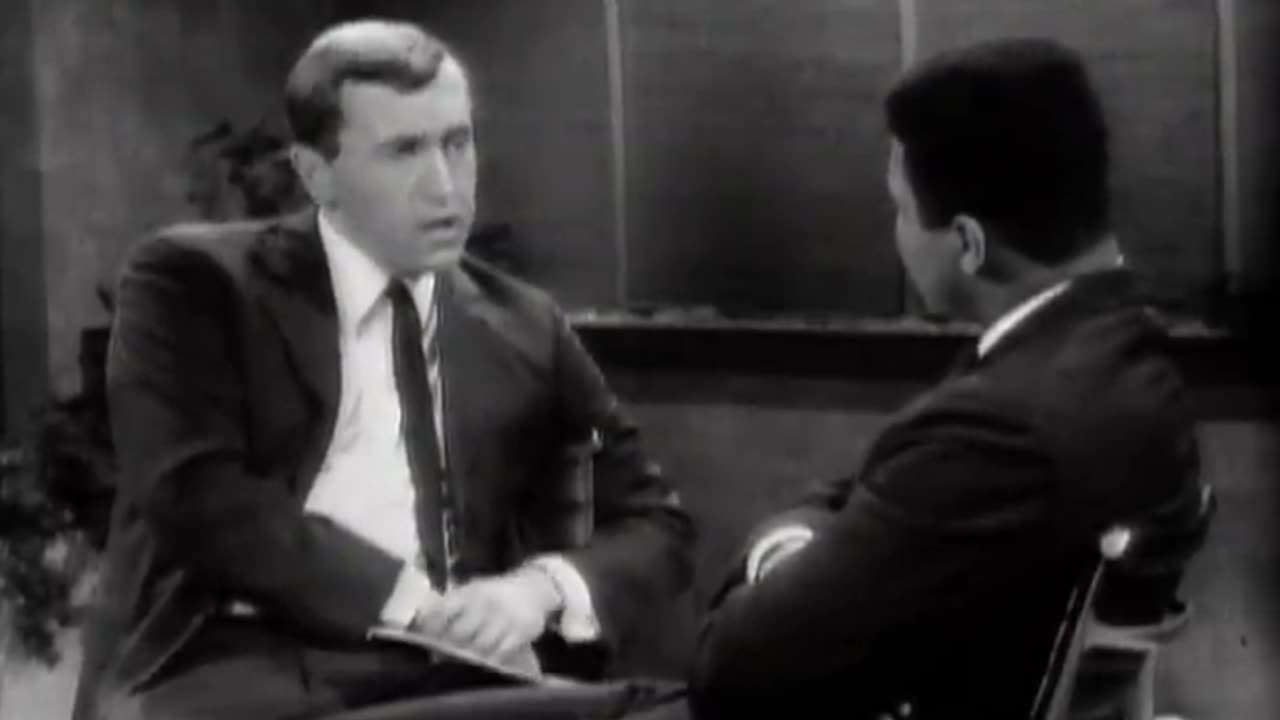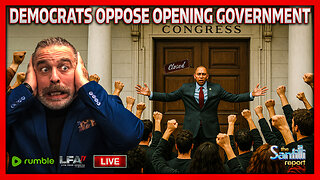Premium Only Content

Muhammed Ali never seen before interview with Robert Frost - A must watch
Muhammad Ali is interviewed by David Frost in New York, during a period when he had been stripped of his title and boxing license for refusing to be drafted into the Vietnam conflict. David Frost presents the programme from New York City, as his guest Muhammed Ali has been unwell and currently recovering from a bought of influenza. They discuss the recent controversy surrounding Ali's refusal to serve in the U.S Army and fight for his country in Vietnam. He was stripped of his World Heavyweight Boxing Championship award as a result. Ali talks about a new business idea he has to encourage black people to get into business selling his 'Champ Burger.' Ali demonstrates the legendary speed of his punch on David Frost's hand. Ali expresses regret at hurting Henry Cooper and explains why it is so easy to make him bleed. Ali describes the time he was refused the sale of a burger in America and how it made him feel angry. He believes that white Americans are devils and the enemy of black people. He backs this up with religious readings. Frost explains to Ali that the 'gentiles' he describes also includes black people. He refuses to agree and the two debate this for some time. In part two, Ali asserts that black and white people may get along by the very nature of their differences. He does not want white people having inter-racial marriages with black people. Frost probes Ali further and asks what his thoughts are of Governor Wallace. Frost respects Wallace's open views and claims that all white people feel that way, but will not say it to you face. He admires Wallace's honesty. Ali believes black and white people are diametrically opposed to each other and in another analogy, he explains how adding cream to black coffee weakens it. Frost argues it tastes better with cream.
This film was first broadcast: 13 Dec 1968
Muhammad Ali, born Cassius Marcellus Clay Jr., was a legendary boxer who transcended his sport and became a global icon for his athletic prowess, his social activism, and his charisma. He was born on January 17, 1942, in Louisville, Kentucky, and began boxing at the age of 12. He quickly showed a natural talent for the sport and went on to become one of the greatest boxers of all time.
Ali's professional career spanned from 1960 to 1981, during which he won numerous titles and accolades. He became the Olympic gold medalist in 1960, won the heavyweight championship three times, and compiled a record of 56 wins and only 5 losses. He was known for his unique fighting style, which combined quick footwork, lightning-fast punches, and an unorthodox defensive technique that he called the "Ali Shuffle."
However, Ali's impact on the world went beyond his boxing achievements. He was a larger-than-life figure who spoke out on a wide range of social and political issues, including civil rights, war, and religion. He famously refused to be drafted into the Vietnam War, citing his religious beliefs and opposition to the war as reasons for his decision. He was stripped of his boxing titles and banned from the sport for several years, but he continued to speak out against the war and became a symbol of resistance and defiance for many.
Ali's commitment to social justice and civil rights was also evident in his personal life. He converted to Islam in the 1960s and changed his name from Cassius Clay to Muhammad Ali, which he described as his "slave name." He was an advocate for racial equality and spoke out against discrimination and prejudice in all its forms. He also used his platform to support charitable causes and raise awareness about issues such as poverty, hunger, and disease.
Despite his many accomplishments and contributions to society, Ali was not without his flaws and controversies. He was known for his trash-talking and often provocative behavior, which earned him both admirers and critics. He was involved in several high-profile fights, including the "Fight of the Century" against Joe Frazier and the "Rumble in the Jungle" against George Foreman, both of which are considered some of the greatest boxing matches in history.
In his later years, Ali battled Parkinson's disease, which many believe was caused by the head trauma he suffered during his boxing career. However, he remained an influential figure until his death in 2016 at the age of 74. He continued to inspire and influence people around the world with his words and actions, and his legacy as a boxer, social activist, and cultural icon continues to endure.
Today, Muhammad Ali is remembered not only as one of the greatest boxers of all time but also as a symbol of courage, perseverance, and social justice. He used his fame and influence to champion causes that were important to him, and his impact on the world goes far beyond the boxing ring. He remains an inspiration to many and a reminder of the power of individual action to make a positive difference in the world.
-
 LIVE
LIVE
Side Scrollers Podcast
2 hours agoMario Galaxy Movie Trailer REACTION + Black Lesbian GOES OFF on Weiner + More | Side Scrollers
693 watching -
 15:49
15:49
Rethinking the Dollar
2 hours agoThis Crypto ‘Freeze Code’ Warning Changes Everything
5K3 -
 1:10:03
1:10:03
The Rubin Report
3 hours ago‘The View’s Sunny Hostin Tries to Shame John Fetterman Until He Puts Her in Her Place
109K51 -
 LIVE
LIVE
LFA TV
16 hours agoLIVE & BREAKING NEWS! | WEDNESDAY 11/12/25
2,940 watching -
 18:53
18:53
Professor Nez
2 hours agoDemocrats TURN on Chuck Schumer & BOOT HIM OUT of the Party!
20.9K6 -
 1:36:52
1:36:52
The Mel K Show
2 hours agoMORNINGS WITH MEL K - Dueling Narratives & Endless Distraction: Don’t Lose Focus! - 11-12-25
23.3K5 -
 LIVE
LIVE
The Shannon Joy Show
2 hours agoH1-B-Trayal! How Many Times Does Trump Have To Punch MAGA In The Face Before They Realize He’s Just Not That Into Them?
196 watching -
 1:56:53
1:56:53
Badlands Media
11 hours agoBadlands Daily: November 12, 2025 – Epstein Emails, COVID Lies & Constitutional Chaos
101K10 -
 43:54
43:54
VINCE
4 hours agoThomas Speciale: The Man Behind John Brennan's Meltdown | Episode 167 - 11/12/25 VINCE
91.3K122 -
 2:42:30
2:42:30
Nikko Ortiz
3 hours agoMILITARY FAILS AND KAREN ACTIVITIES... |Rumble Live
30.8K3